| Main Ref: | 41805 |
| Disease type: | Parasitic infestations (protozoa, worms, etc.) |
| Disease name: | Anchorworm Disease (Lernaea sp.) |
| Other names: | |
| Caus. agent: | Lernaea sp. |
| Group: |
| Part of body and/or behavior affected by disease: | ||
| Skins and/or fins | Belly | Swimming behavior |
| Gills | Anus | Other behavior |
| Eyes | Viscera Afflicted | Other symptoms |
| Fish affected: | ||
| Symptoms: | Wound on the skin and muscular tissue. | |
| Treatments: | Best treatment is Trichlorfon: 0.25-3.0 mg/1 liter water for 3 days. Careful not to over dose. Also the use of Diflubenzuron (Dose: 25-50 mg/100 l for 2 days) can have good results. | |
| Prophylaxis: | Observation of new fish in quarantine for one week. Avoid live fish food, tadpoles, plants and decorations from rivers, ponds or lakes, this can introduce larvae or eggs. Ref. 48502. | |
| Remarks: | The head of the parasite is hooked inside the fish for a few millimeters, only the body with two eggsacs hangs freely in the water. An ulcer may appear on the site where the parasite is located. This can result in bacterial infection and later may develop secondary fungal infection. Ref. 48502. | |
| Mortality and seasonality | ||
| Mortality: | ||
| Seasonality: | ||
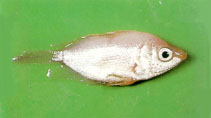
picture (AnchorD1.jpg) by Bassleer, G. |
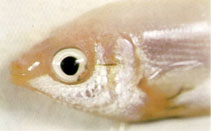
picture (AnchorD2.jpg) by Bassleer, G. |
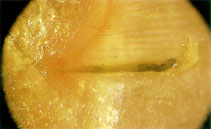
picture (AnchorD3.jpg) by Bassleer, G. |
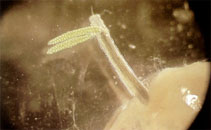
picture (AnchorD4.jpg) by Bassleer, G. |
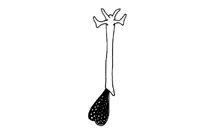
picture (LernaeD0.gif) by Bassleer, G. |
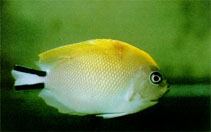
picture (LernaeD9.jpg) by Bassleer, G. |
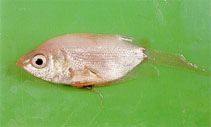
picture (LernaeDa.jpg) by Bassleer, G. |